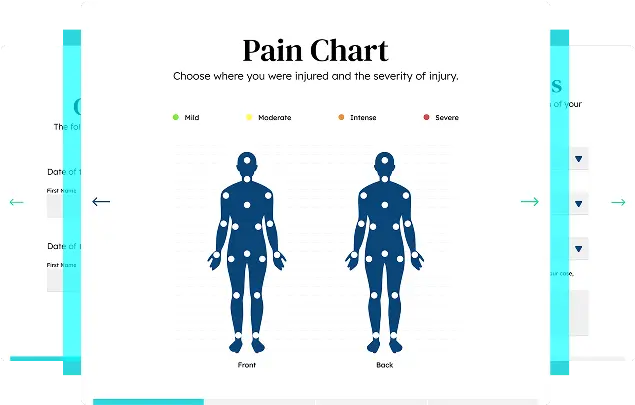Massachusetts Car Accident Lawyer
Have you recently suffered critical injuries in a motor vehicle wreck? Has your life been turned upside down by the injuries you sustained? Are you confused and wondering what your next steps should be?
Get Free Advice About The Compensation You Deserve
Home » Massachusetts Personal Injury Lawyer » Massachusetts Car Accident Lawyer
Reviewed by: Christopher DiBella
April 9, 2025
If so, you are not alone. Car accident victims across Massachusetts can turn to an experienced Massachusetts personal injury lawyer at DiBella Law for the legal guidance and support they need when they need it most. The claims process does not need to be overwhelming when you have a powerful legal advocate on your side.
A reputable Massachusetts car accident lawyer at our firm can help you identify those responsible and ensure you are awarded maximum compensation for your damages and suffering. Contact our legal team for a free consultation today. When you do, you can discuss the value of your damages, and potential at-fault parties, and learn more about the laws that could have an impact on the outcome of your case.
How Car Accident Victims in MA Are Compensated
There are multiple ways you can recover the compensation you deserve following a car accident in Massachusetts. Many car accident victims will start their cases by filing a claim against their insurance policies. Under Massachusetts auto insurance laws, all motorists are required to carry personal injury protection coverage since MA follows a no-fault insurance system.
This means no matter who is responsible for causing the accident, you will start by filing a claim with your own auto insurance provider. Then, the insurance company has the option of recouping what they pay you by filing a subrogation complaint against the liable party. Unfortunately, insurance coverage is often not enough to ensure injury victims are fairly compensated for their damages.
When this happens, you will need to prepare to bring your car accident case to trial. In court, you will not have to face the same limitations that come with insurance policies and can be awarded reimbursement for every single loss. If your car accident lawsuit is successful, you could be repaid for not only your auto repair costs and medical expenses but also your pain and suffering, diminished quality of life, loss of consortium, mental anguish, and other economic and non-economic damages.
What to Expect from the Insurance Company
Dealing with the insurance company is one of the most important aspects of any car accident claim. Sadly, auto insurance companies are not victim advocates. Despite advertising themselves as being “good neighbors” or “on your side,” the truth is most insurance providers prioritize their financial needs above their claimants and policyholders.
Your car accident attorney in Massachusetts at DiBella Law will be prepared to challenge the insurance company when they handle your claim in bad faith. It is not unusual for insurance adjusters to attempt to manipulate car accident victims and misrepresent policy terms to pay out as little as possible. Fortunately, our legal team has substantial experience negotiating with insurance companies and will never allow them to take advantage of you.
It is also important to keep in mind that insurance settlement may not fully cover your damages. Even when the insurance company does pay out on a claim, it will typically only pay for specific types of covered losses as outlined in your policy terms. For that reason, it is always a good idea to prepare to bring your car accident case before a judge and jury if you hope to maximize your financial compensation.
We’ve offered crucial support and guidance to individuals who have suffered injuries, ensuring their financial and emotional well-being.
Massachusetts Shared Liability Laws Could Impact Your Settlement
Sharing liability is not at all uncommon in a Massachusetts car accident case. The state follows a modified comparative negligence system with a 51% bar threshold. If your portion of blame exceeds this limit, you lose the right to seek compensation for your damages, and if your portion of fault is less than the threshold, you can expect your injury settlement to be reduced proportionately.
Unfortunately, many liable parties and insurance companies attempt to capitalize on these laws. If they can blame you for causing the accident, they can pay out less in your insurance settlement or trial verdict. Having a reputable car accident lawyer in Massachusetts working for you could make all the difference.
We will be prepared if the liable parties try to place unfounded blame on you. Our in-depth investigation after taking on your case will yield powerful evidence that can be used to challenge these claims. This way, you do not have to worry about a sizable portion of your settlement being deducted from your award.
Get immediate case evaluation with no cost or obligation to you in less than 5 minutes.

Common Causes of Massachusetts Car Accidents
The only way your car accident case could be successful is if your car accident lawyer in MA can prove someone else is at fault. To do this, we will need to identify the cause of the collision. Some of the top causes of car crashes in Massachusetts include:
- Drunk driving
- Dangerous roads
- Inclement weather
- Distracted driving
- Road rage
- Speeding
- Defective auto parts
- Wildlife
- Drowsy driving
- Aggressive driving
- Failure to yield or stop
- Following too closely
Once your personal injury attorney has figured out how the accident happened, we can begin investigating and collecting evidence to prove liability. Most often, negligent drivers, auto parts manufacturers, and the Massachusetts Department of Transportation are found to share the blame for the victim’s injuries. If multiple parties are found to share liability, it may complicate your case, but you will also have a greater chance of recovering compensation for every loss.
Get Help from a Massachusetts Car Accident Attorney Today
The trauma of your car crash does not need to haunt you for the rest of your life. Making the liable party pay for your damages could be the best way to cover outstanding debts and protect your financial future. With a powerful legal advocate on your side, you can maximize your compensation and ensure all parties that contributed to your injuries are held accountable to the greatest extent the law allows.
Connect with a dedicated Massachusetts car accident lawyer at DiBella Law today. Our team is proud to offer 100% free consultations to car accident victims across Methuen, Andover, Burlington, Arlington, Haverhill, and surrounding communities. Claim yours by completing our online contact form or calling our office today.
